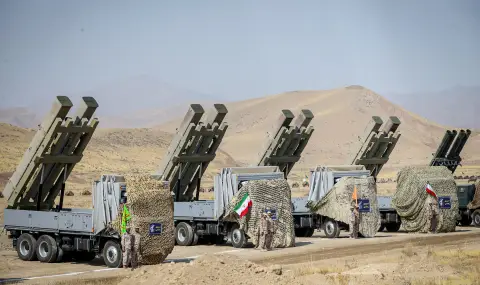An ally of Israel during the Shah's regime, Iran, who carried out a drone attack against Israel yesterday, passed after the Islamic Revolution in 1979 into the camp of its sworn enemies, writes BTA, citing AFP.
Two years after the creation of Israel, Iran became in 1950 the second Muslim country after Turkey to recognize the new state. At the time, Iran was home to the largest Jewish community in the Middle East. Israel has a large diplomatic mission in Iran and imports 40 percent of the oil it needs from that country in exchange for weapons, technology and agricultural products.
The dreaded Iranian political police, SAVAK, was created in 1957 with the help of the American CIA and Israel's Mossad. In 1979, with the establishment of the Islamic Republic, Iran severed all official relations with Israel and stopped recognizing it as a state. But informal commercial ties are maintained.
In 1980, the Iranian-backed "Islamic Jihad" became the first Palestinian Islamist organization to launch an armed struggle against Israel. But during the Iran-Iraq war (1980-1988), Israel supplied missiles to Tehran. This was revealed in the framework of the affair with the sale of American weapons to Iran (the Iran-contra affair), aimed at securing the release of American hostages held in Lebanon.
In 1982, Israel invaded Lebanon to stop Palestinian attacks. The Islamic Revolutionary Guard Corps, the ideological army of the Islamic Republic, helped create "Hezbollah" - the Shiite movement that settled in southern Lebanon and waged an armed struggle against Israel. Iran and "Hezbollah" are accused by Israel of being involved in many attacks against Israeli or Jewish interests abroad.
In 1998, Iran says it first tested a surface-to-surface missile "Shahab-3" with a range of 1,300 km, capable of reaching Israel. With the election in 2005 of Mahmoud Ahmadinejad, tensions increased significantly. The ultra-conservative president has repeatedly predicted Israel's disappearance from the map and called the Holocaust a "myth". In the same year, Iran resumed its uranium enrichment activities in Isfahan (Central Iran).
In July 2015, Iran signed an agreement with major world powers that set limits on its nuclear program. "Israel is not bound by this agreement... because Iran continues to want our destruction," warned Prime Minister Benjamin Netanyahu. Israel supports the US decision in May 2018 to withdraw from the agreement. Since 2013, while Syria has been at war, Israel has frowned upon the military intervention of "Hezbollah" and her Iranian mentor in support of Bashar al-Assad's regime.
Israel has launched hundreds of strikes in its neighboring country, targeting government troops, Iranian forces and Hezbollah fighters. In November 2017, Netanyahu talked about "secretly" and "fruitful cooperation" with Arab countries in the context of concern over Iran's growing influence in the Middle East. In September 2020, the UAE and Bahrain, allies of Saudi Arabia who, like Israel, are hostile to Iran, signed agreements to normalize relations with Israel. In the following months, Israel blamed Iran for attacks on ships, while Iran pointed the finger at Israel for killing Iranian officials and sabotaging the uranium enrichment plant in Natanz (Central Iran).
Attacks against Iranian targets blamed on Israel are increasing. In November 2022, a colonel was killed, and then in December 2023, a guard corps commander was killed. On April 1, 2024, an airstrike blamed on Israel destroyed the Iranian consulate in Damascus. According to the NGO, 16 people were killed, including two generals from the Guards Corps. The American president assures his Israeli ally of the "unshakable" your support. Almost 2 weeks after this strike, Iran launched a drone attack from its territory on April 13 against Israel, which decided to close its airspace. Shortly before the announcement of this attack, Netanyahu assured that his country was prepared for "the possibility of a direct attack by Iran".
